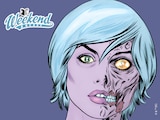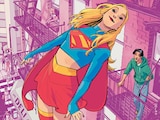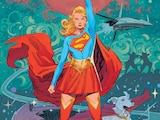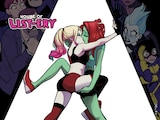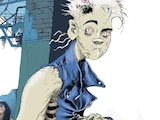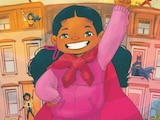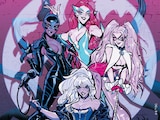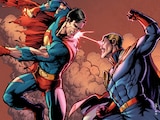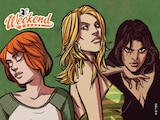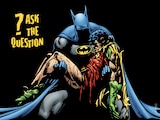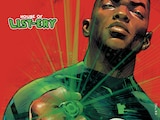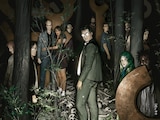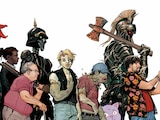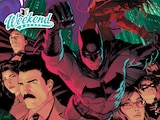Every year, all of us at DCComics.com like to take Pride Month as a moment not just to showcase our favorite queer characters, but to take stock on where we are in representing the most isolated and vulnerable among us and provide a warm and welcome light. To use the power of our stories to show the people who need the message most that they are far from alone, and that the comics community is a place where it’s not only acceptable, but heroic, to recognize yourself for the person you are in your heart.
Few people have accomplished this as heartily as Galaxy: The Prettiest Star author Jadzia Axelrod, whose new young adult graphic novel with phenomenal artist Jess Taylor tells the story of Taylor Barzelay, an alien princess who must gain the courage to shed her disguise as a human boy for a life of happiness and self-acceptance. The powerful trans narrative within is apparent right from the dedication page: “For the girl who needed this book ages ago, and couldn’t find it.”
We were fortunate enough to get a few moments to speak with Jadzia about creating this new character for the DC Universe, the care that goes into writing a story designed to assure readers that queerness itself is a gift, and the timelessness of David Bowie.

Unlike many of DC’s graphic novels, Galaxy is about a brand-new cosmic character with her own unique powers and backstory. How did you approach creating a new character and setting for DC from scratch, and then finding the right place to attach her to the DC Universe?
Well, it was both easy and difficult because there are so many superpowered aliens in the DCU. That’s great, but it’s also, “How do you make one that’s distinctive?” I have a familiarity with these types of characters, so it was just like, “What have I not seen? What do I think would be interesting to show, visually?”
I think the key to any sort of comic book superpower is how it’s going to look when the artist draws it. One thing I love is that Galaxy has this thing called “Cyandii Vision,” which is what we called it in the script. And Jess just ran with it and did these beautiful impressionistic versions of how Galaxy can sense and manipulate the various energies that are around us all the time. Jess created this amazing, stylized way of looking at that with all these bright pinks and purples and blues. It looks very unnatural and alien, but also recognizable. It was even better than it was in my imagination, but also, it worked metaphorically in the story, in that she’s sensitive to things around her that other people aren’t. And so, the microaggressions and the things she feels as a queer trans woman are reflected in her power set, which is that she understands the larger picture around her, even if everyone else around her does not.

It was an interesting choice to contrast her experience with Superman.
Right. Her origin and Superman’s origin are very similar and that was intentional. I wanted her to be in a rural community because I grew up in a rural community. You can’t have a rural community superhero without at least acknowledging that that’s where Superman started because he started all the superheroes. And so, rather than ignore that, or try to pretend that’s not true, I leaned into it. But it’s done in a way to show that while the concept of an alien from another planet who has superpowers is something that is universal and beloved, when you make that character a cis white man, it doesn’t mean everything to everyone. To show someone with a very similar origin, but a radically different point of view was important to me.
Speaking of your inspirations, you can find David Bowie references all throughout Galaxy: The Prettiest Star. What is it about Bowie’s music and persona that makes it such a guiding force for the book?
Well, in writing a teenage character, my impulse was to write about all the things I liked and enjoyed as a teenager, and what discoveries I made that really resonated with me, and number one with a bullet was David Bowie. When a friend lent me some David Bowie, the music was…incredible. It was electrifying. And it was more than just great songs, it was a type of queerness that I had never experienced before. It was unashamed, unapologetic and sexy in a way that I don’t remember seeing in the media that I grew up with. And so, when telling this story about unapologetic and positive queerness and transness, I had to bring in David Bowie because especially ‘70s David Bowie really reflects that theme. The whole alien persona. It fit very cleanly together, and I was very proud of that.
David Bowie feels to me like a person who very clearly stated the kind of person he was and people just didn’t believe him. They didn’t take him at face value. They challenged his expressions of gender and sexuality.
Over and over again!

“I don’t know how many times I have to tell you this, this is who I am.” That felt very resonant with what Galaxy was going through to me.
Absolutely. I almost didn’t include the David Bowie references. I thought maybe we should pick someone a little more recent. But I couldn’t think of anyone who resonated in the same way because so many people who do the kind of things that play with gender and sexuality—Janelle Monae is an excellent example—are building on Bowie! (laughs)
Also, I did the math, and it’s been fifty years since Ziggy Stardust came out. Then it becomes something other than just Taylor listening to the music that Jadzia listened to as a teenager, because that music was twenty years past when I was a teenager. By being so old, it becomes a discovery of something archetypal.
On the subject of archetypes, superhero comics, from the very beginning, have always been predicated on this idea of the dual identity. Reading Galaxy, it feels like the book has a lot to say about this theme.
Well, I think that having a secret identity is something that every queer and trans person knows. It’s something we have grown up knowing and understanding—that there is a part of yourself that maybe for safety reasons, maybe for others, you can’t share. So, that metaphor is already there for me. I didn’t have to do anything. It’s already laid out. So, I didn’t delve too deeply into that. Also, I didn’t want Galaxy to have a secret identity in the end. I didn’t want her to be able to turn back into human at the drop of a hat. I wanted to be like, this is who she is. This has always been who she is. The costume, the disguise that everyone was used to, was a temporary look. This is who she is, and she’s never going back.

When telling these trans or queer narratives, there’s sometimes a discussion of losing the message by having a queer protagonist who’s a supernatural, artificial, or separate species, obscuring their humanity by othering an already abstracted and marginalized people. Were you concerned about Galaxy’s identity as an alien conflicting with the trans story you were trying to tell?
Absolutely, because as a nerd and a trans woman, I’ve read and watched all those stories and been disappointed. So, I was definitely wary of what I was doing and really wanted to stick the landing on this. I could have told this story without the sci-fi gloss. Or with a different sci-fi gloss that would have kept Taylor a human being.
And…I didn’t want to do that, for two reasons. One is that I felt like an alien growing up. I felt like everyone else was following certain rules and scripts that were natural to them and were definitely not natural to me. So, that metaphor just immediately spoke to me in a way to sum up my teenage angst. But on top of that, the other element is that I didn’t want to write this just for trans people. I wanted it to also resonate with people who were cis, or who were not trans femme. I didn’t want to get bogged down in specifics that would turn them off from a story they could very much relate to. I think we’ve all felt that people aren’t seeing who we are, and that we have to perform to a certain degree of expectations. I think that’s something a lot of teenagers feel, and a lot of adults feel.
I am a trans woman. I want trans feminine people to see themselves in this because I want to see myself. So, I wanted to get the details right and the hope was that a trans feminine person would see those details and that it would resonate with them in that way. And that a cis person, or a trans masculine person, or a nonbinary person, or anyone else would see the broad strokes and that would resonate with them.

In “Up at Bat,” your story in this year’s DC Pride special, you’ll be the first trans author to write Barbara Gordon’s former roommate Alysia Yeoh. Until now, we’ve mostly known Alysia as “Batgirl’s Friend.” But who is she in her own right?
That was something I really wanted to do in this story—to center her. There’s always a danger when you put someone next to someone as cool as Batgirl—and it doesn’t matter which Batgirl we’re talking about—anyone next to that is not going to get as much attention. So, it was really important to me to make Alysia the focus. Part of that was to go back to the old Gail Simone books where Alysia first appeared and really see who Alysia is.
I was looking through those comics, and one of the great things about them is Batgirl’s omnipresent narration. She is constantly talking about what’s going on and it’s done with wit, humor and panic in some places, and it’s amazing. So, what I wanted to do with Alysia’s story was to flip that.
Alysia is narrating now. We get to know what’s in her head. Once I came up with that, she was centered because she is telling the story. So, it’s a Batgirl story in the sense that Batgirl is there, but Batgirl is not centered. Alysia is centered. She is the one in control of the narrative.
It also meant I could spend even more time reveling in Alysia’s voice and her particular way of seeing things. We set up some really cool ideas of where she could go and I would love to explore those further. I have so many ideas about where the story we set up in Pride can go.

The best thing about Galaxy and “Up at Bat,” is that they feel primarily designed to inspire and encourage the trans readers who need to feel seen and speak to them on their own terms. To readers who are seeing themselves in Galaxy and Alysia for the first time—and I know they’re out there, I’ve been seeing them on Twitter—what advice can you give on where to go and what to do next?
I think the main thing that I want to give people with these stories is pride. I want them not to look at their transness and their queerness as something that is an obstacle, or even neutral. I want them to be proud of who they are and what has happened to them in their lives. Because that point of view makes them…great. And it’s something worth celebrating.
As far as what to do going forward, I would like to see them go forward as loud and as declamatory as possible. Exclaiming who they are and rejoicing in it, in a grand Walt Whitman sort of fashion. Because so many people right now, especially people who are in places of power in government, don’t want to see us and would rather that we didn’t exist. I can think of no better response to that than to proudly and joyfully be who we are.
And not everyone can. Because of those people, and of others, there are all sorts of safety issues. If you have to stay hidden because of safety reasons, then by all means…but if you don’t? Then why shouldn’t we be as loud and as proud as possible?
I think that’s the message of Galaxy itself. That existing as your true self is, in itself, a heroic action.
I like to think that. Yes.
Galaxy: The Prettiest Star by Jadzia Axelrod and Jess Taylor is now available in bookstores, comic shops, libraries and as a digital graphic novel. DC Pride 2022 #1, featuring "Up at Bat" by Jadzia Axelrod and Lynne Yoshii, will be available in print and as a digital comic book on June 7, 2022.
Alex Jaffe is the author of our monthly "Ask the Question" column and writes about TV, movies, comics and superhero history for DCComics.com. Follow him on Twitter at @AlexJaffe and find him in the DC Community as HubCityQuestion.

